INDIGENOUS SELF-GOVERNMENT: A COMPARATIVE STUDY BETWEEN BRAZIL AND BOLIVIA
Main Article Content
Abstract
This article aims to investigate if the Brazilian Constitution of 1988 guarantees the prerogative of self-government to Indigenous communities, according to the canons of the new Latin American constitutionalism present in the Constitution of Bolivia. A deductive and comparative study is carried out with documental and bibliographical analysis, using descriptive statistics to perform comparative analyses. The results show that, when comparing the constitutional models of Brazil and Bolivia, it is possible to notice that in the Brazilian Constitution, the Western Eurocentric paradigm affirms constitutional sovereignty and a monistic (hegemonic) system of Law. By contrast, the Bolivian archetype proposes to implement the self-government and self-determination of the Indigenous communities. The Brazilian paradigm promotes an anti-Indigenous policy, in favor of a capitalist economic model, demanding alternative ways of interpreting the Constitution to identify instruments that ensure the self-determination and autonomy of the native peoples in Brazil.
Article Details
I (we) submit this article which is original and unpublished, of my (our) own authorship, to the evaluation of the Veredas do Direito Journal, and agree that the related copyrights will become exclusive property of the Journal, being prohibited any partial or total copy in any other part or other printed or online communication vehicle dissociated from the Veredas do Direito Journal, without the necessary and prior authorization that should be requested in writing to Editor in Chief. I (we) also declare that there is no conflict of interest between the articles theme, the author (s) and enterprises, institutions or individuals.
I (we) recognize that the Veredas do Direito Journal is licensed under a CREATIVE COMMONS LICENSE.
Licença Creative Commons Attribution 3.0



































